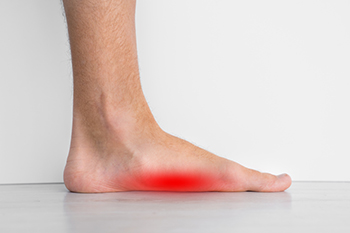
Flat feet, also known as fallen arches, can be a source of persistent discomfort and pain for many individuals. This common condition occurs when the arches of the feet collapse, causing the entire sole to make contact with the ground. Understanding the root causes of flat feet pain is the first step toward finding effective solutions. One primary cause of flat feet pain is genetics. If you have a family history of flat feet, you are more likely to develop them. Additionally, injuries or overuse can contribute to the development of flat feet over time. Obesity and pregnancy can also put excess strain on the arches, exacerbating the condition. The good news is that flat feet pain can often be managed and relieved. Wearing footwear with proper arch support can significantly reduce discomfort. Stretching and strengthening exercises may help improve foot and leg muscle function, offering relief from pain associated with flat feet. In more severe cases, medical intervention or surgery may be considered. If you have flat feet, it is suggested that you consult a podiatrist who may prescribe custom orthotic inserts, which can provide tailored support.
Flatfoot is a condition many people suffer from. If you have flat feet, contact Dr. John P. Beaupied from Palos Podiatry. Our doctor will treat your foot and ankle needs.
What Are Flat Feet?
Flatfoot is a condition in which the arch of the foot is depressed and the sole of the foot is almost completely in contact with the ground. About 20-30% of the population generally has flat feet because their arches never formed during growth.
Conditions & Problems:
Having flat feet makes it difficult to run or walk because of the stress placed on the ankles.
Alignment – The general alignment of your legs can be disrupted, because the ankles move inward which can cause major discomfort.
Knees – If you have complications with your knees, flat feet can be a contributor to arthritis in that area.
Symptoms
- Pain around the heel or arch area
- Trouble standing on the tip toe
- Swelling around the inside of the ankle
- Flat look to one or both feet
- Having your shoes feel uneven when worn
Treatment
If you are experiencing pain and stress on the foot you may weaken the posterior tibial tendon, which runs around the inside of the ankle.
If you have any questions please feel free to contact our office located in Palos Heights, IL . We offer the newest diagnostic and treatment technologies for all your foot and ankle needs.



